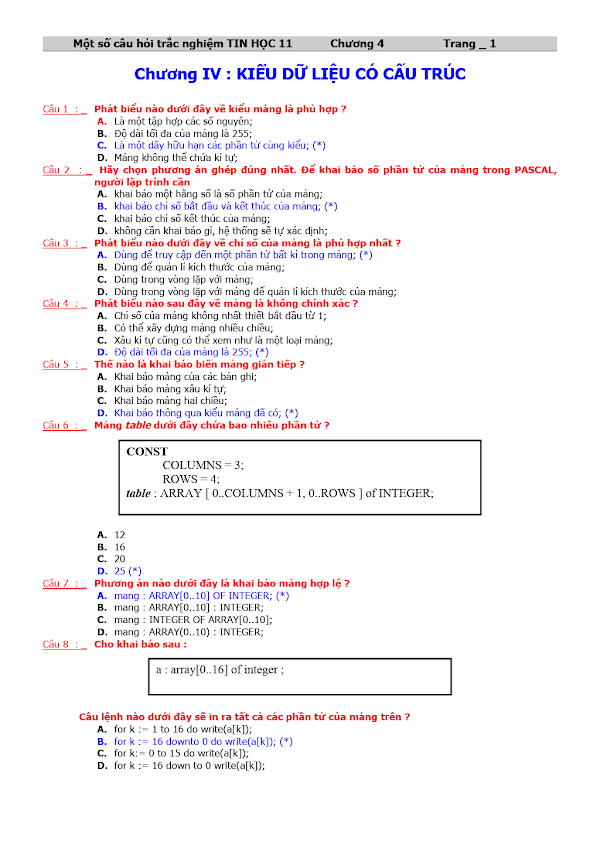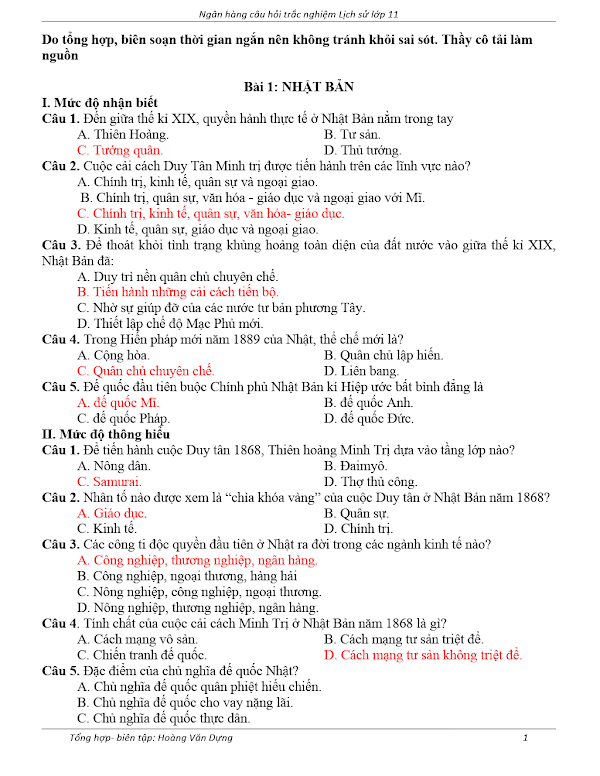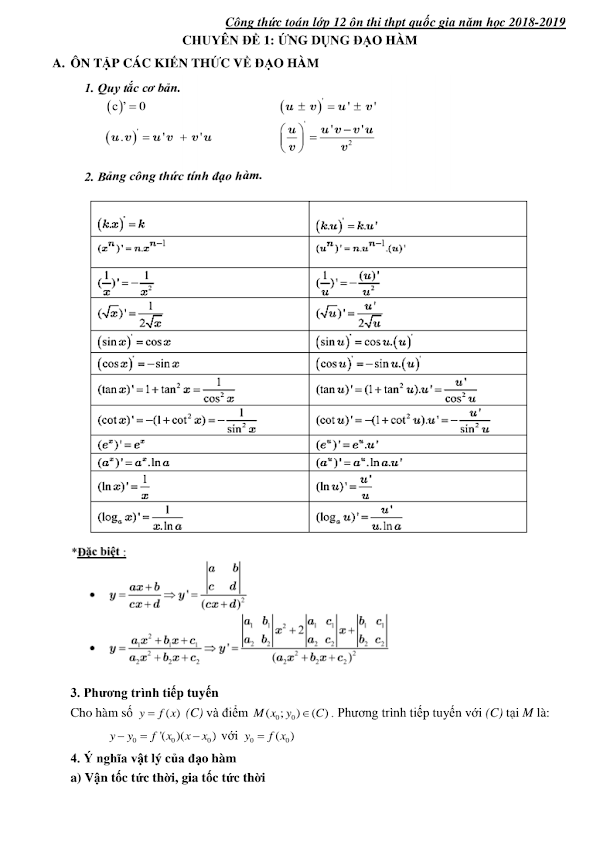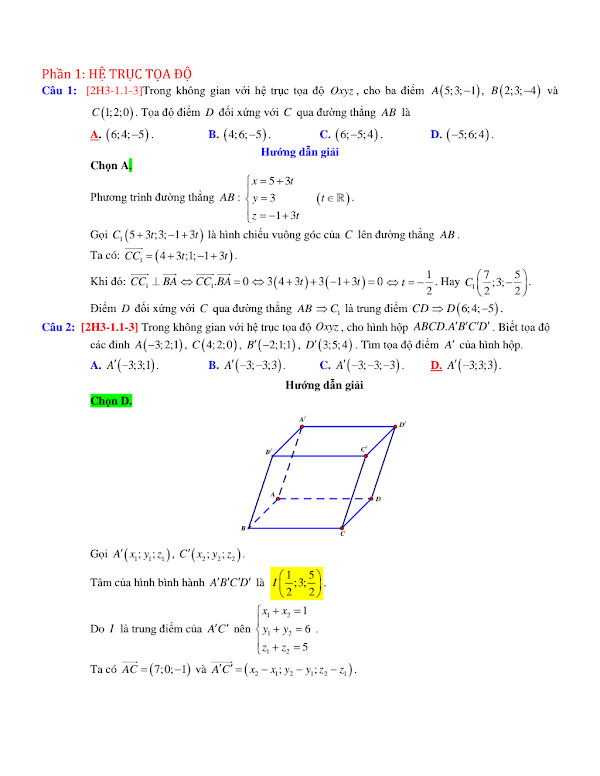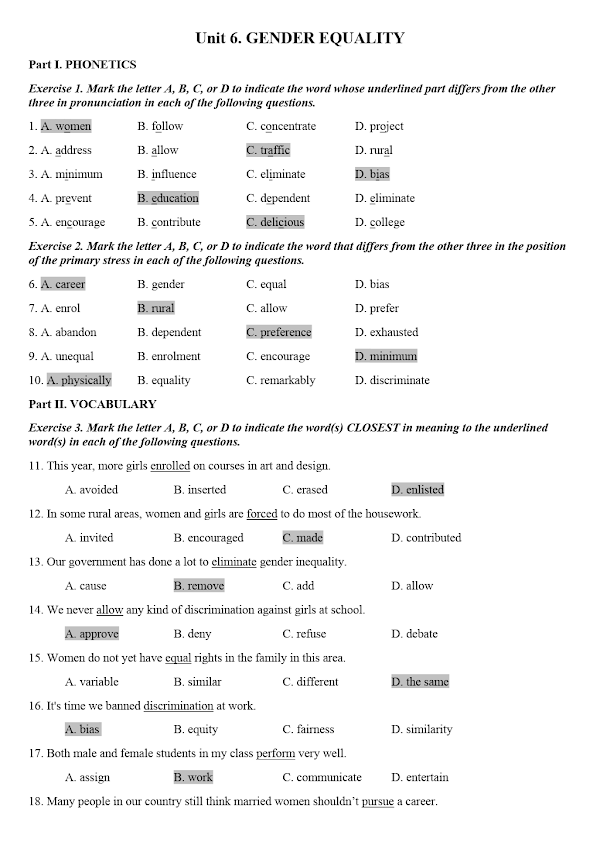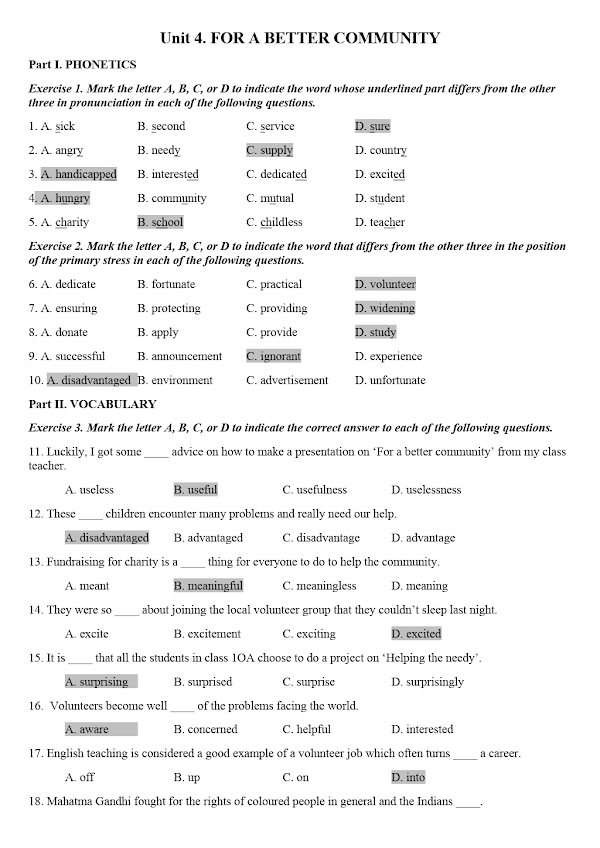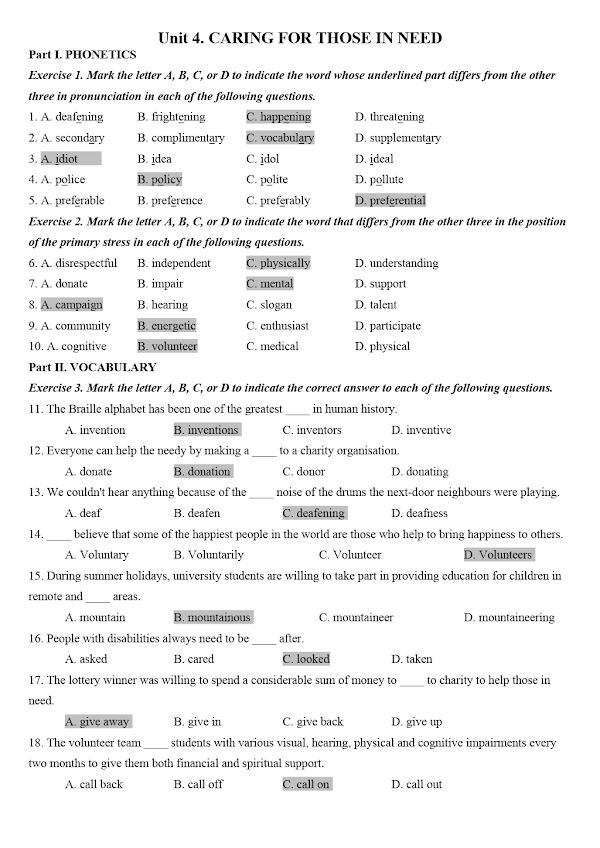Đề luyện thi THPTQG năm 2020 môn Tiếng Anh (có đáp án)
Chào các bạn học sinh và quý thầy cô, hôm nay LogaVN gửi tới bạn đọc tài liệu "Đề luyện thi THPTQG năm 2020 môn Tiếng Anh (có đáp án)". Hi vọng sẽ giúp ích cho các bạn học tập và giảng dạy.
ĐỀ THI THỬ THPTQG MÔN TIẾNG ANH
NĂM 2020 CÓ ĐÁP ÁN
Mark the letter A, B, C, or D on your answer sheet to indicate the word whose underlined part differs from the other three in pronunciation in each of the following questions.
Question 1: A. attempts B. borders C. comments D. respects
Question 2: A. sorrow B. pillow C. allow D. follow
Mark the letter A, B, C, or D on your answer sheet to indicate the word that differs from the other three in the position of primary stress in each of the following questions.
Question 3: A. perform B. invent C. attempt D. motion
Question 4: A. volunteer B. lawmaker C. citadel D. dietary
Mark the letter A, B, C, or D on your answer sheet to indicate the correct answer to each of the following questions.
Question 5: You will get a good seat if you ______ first.
A. come B. came C. have come D. will come
Question 6: I ______ a terrible accident while I ______ on the beach.
A. see / am walking C. saw / was walking
B. was seeing / walked D. have seen / were walking
Question 7: The boy insisted on ______ a break after lunch.
A. having B. to have C. not to have D. have
Question 8: You couldn't help me with my homework, ______?
A. could you B. couldn't you C. will you D. won’t you
Question 9: Columbus discovered America ______ the 15th century.
A. on B. at C. in D. to
Question 10: I like ______ books better than films.
A. a B. an C. the D. Ø (no article)
Question 11: ______, the goods are inspected carefully.
A. When the goods arrived at the shop B. When we will arrive at the shop
C. On arrival at the shop D. During arrival at the shop
Question 12: We didn’t go anywhere yesterday ______ the rain.
A. in spite of B. though C. because D. because of
HYPERLINK "https://vndoc.com/thi-thpt-quoc-gia-tieng-anh" ĐỀ THI THỬ THPTQG MÔN TIẾNG ANH
NĂM 2020 CÓ ĐÁP ÁN
Mark the letter A, B, C, or D on your answer sheet to indicate the word whose underlined part differs from the other three in pronunciation in each of the following questions.
Question 1: A. attempts B. borders C. comments D. respects
Question 2: A. sorrow B. pillow C. allow D. follow
Mark the letter A, B, C, or D on your answer sheet to indicate the word that differs from the other three in the position of primary stress in each of the following questions.
Question 3: A. perform B. invent C. attempt D. motion
Question 4: A. volunteer B. lawmaker C. citadel D. dietary
Mark the letter A, B, C, or D on your answer sheet to indicate the correct answer to each of the following questions.
Question 5: You will get a good seat if you ______ first.
A. come B. came C. have come D. will come
Question 6: I ______ a terrible accident while I ______ on the beach.
A. see / am walking C. saw / was walking
B. was seeing / walked D. have seen / were walking
Question 7: The boy insisted on ______ a break after lunch.
A. having B. to have C. not to have D. have
Question 8: You couldn't help me with my homework, ______?
A. could you B. couldn't you C. will you D. won’t you
Question 9: Columbus discovered America ______ the 15th century.
A. on B. at C. in D. to
Question 10: I like ______ books better than films.
A. a B. an C. the D. Ø (no article)
Question 11: ______, the goods are inspected carefully.
A. When the goods arrived at the shop B. When we will arrive at the shop
C. On arrival at the shop D. During arrival at the shop
Question 12: We didn’t go anywhere yesterday ______ the rain.
A. in spite of B. though C. because D. because of
Question 13: One recent ______ in medicine is the development of laser in treating cancer.
A. achieving B. achievement C. achievable D. achieved
Question 14: There has been a ______ in Germany and a village was completely destroyed.
A. flood B. shower C. drizzle D. smog
Question 15: He found it impossible to bear the ______ of a nomadic life.
A. amenities B. sourness C. harshness D. happiness
Question 16: Liam had no difficulty in ______ into use the ideal plans her friends had prepared for her.
A. lending B. taking C. putting D. heading
Question 17: The novel ______ by my sister is very interesting.
A. is brought B. bought C. is bringing D. bring
Question 18: She ______ and nursed her mother for many years up to the time of her death.
A. take after B. start over C. looked after D. go over
Question 19: We managed to pull it out of the ______ despite not being at our best for most of the game.
A. bucket B. pocket C. bag D. blanket
Mark the letter A, B, C, or D on your answer sheet to indicate the word(s) CLOSEST in meaning to the un derlined word(s) in each of the following questions.
Question 20: Students from that university have conducted a survey to find out the most effective study habit.
A. organized B. delayed C. encouraged D. proposed
Question 21: There is concern about several confidential documents which have gone missing.
A. attentive B. secretive C. diplomatic D. healthy
Mark the letter A, B, C, or D on your answer sheet to indicate the word(s) OPPOSITE in meaning to the underlined word(s) in each of the following questions.
Question 22: The government is not prepared to tolerate this situation any longer.
A. disallow B. discourage C. discount D. distinguish
Question 23: Fruit and vegetables grew in abundance on the island. The islanders even exported the surplus.
A. large quantity B. small quantity C. excess D. sufficiency
Mark the letter A, B, C, or D on your answer sheet to indicate the option that best completes each of the fol lowing exchanges.
Question 24: Mary and her friend, Encobeill, are in a coffee shop.
- Mary: “Would you like Matcha ice-cream or Caramen?” - Encobeill: “______”
A. Thanks, that’s fine. B. Yes, I’d love too.
C. It doesn’t matter. D. Neither is fine. They are good.
Question 25: Hana and Jenifer are talking about a book they have just read.
- Hana: “The book is really interesting and educational.” - Jenifer: “______”
A. That’s nice of you to say so. B. I’d love it.
C. Don’t mention it. D. I couldn’t agree more.
Read the following passage and mark the letter A, B, C, or D on your answer sheet to indicate the correct word or phrase that best fits each of the numbered blanks from 26 to 30.
The dead return
A festival for the Dead is held once a year in Japan. This festival is a cheerful occasion, for on this day, the dead are said to return to their homes, and they are welcomed by the living. (26) ______ they are expected to be hungry after their long journey, food is laid out for them. Specially – made lanterns are hung outside (27) ______ house to help the dead to find their way. All night long, people dance and sing. In the early morning, the food that had been laid out for the dead is thrown into a river or into the sea as it is considered (28) ______ for anyone living to eat it. In towns (29) ______ are near the sea, the tiny lanterns which had been hung in the streets the night before, are placed into the water when the festival is over. Thousands of lanterns slowly drift out to sea guiding the dead on their return journey to the other world. This is a moving spectacle, for crowds of people stand on the shore (30) ______ the lanterns drifting away until they can be seen no more.
Question 26: A. However B. As C. Nevertheless D. Although
Question 27: A. each B. other C. another D. one
Question 28: A. famous B. happy C. helpful D. lucky
Question 29: A. where B. that C. who D. when
Question 30: A. looking B. seeing C. watching D. supervising
Read the following passage and mark the letter A, B, C, or D on your answer sheet to indicate the correct answer to each of the questions from 31 to 35.
As heart disease continues to be the number-one killer in the United States, researchers have become increasingly interested in identifying the potential risk factors that trigger heart attacks. High-fat diets and “life in the fast lane” have long been known to contribute to the high incidence of heart failure. But according to new studies, the list of risk factors may be significantly longer and quite surprising.
Heart failure, for example appears to have seasonal and temporal patterns. A higher percentage of heart attacks occur in cold weather, and more people experience heart failure on Monday than on any other day of the week. In addition, people are more susceptible to heart attacks in the first few hours after waking. Cardiologists first observed this morning phenomenon in the mid-1980s and have since discovered a number of possible causes. An early-morning rise in blood pressure, heart rate, and concentration of heart-stimulating hormones, plus a reduction of blood flow to the heart, may all contribute to the higher incidence of heart attacks between the hours of 8:00 A.M and 10 A.M.
In other studies, both birthdays and bachelorhood have been implicated as risk factors. Statistics reveal that heart attack rates increase significantly for both females and males in the few days immediately preceding and following their birthdays. And unmarried men are more at risk for heart attacks than their married counterparts. Though stress is thought to be linked in some way to all of the aforementioned risk factors, intense research continues in the hope of further comprehending why and how heart failure is triggered.
Question 31: What is the main idead of the passage?
A. Cardiology in the 1980s
B. Risk factors in heart attacks
C. Diet and stress as factors in heart attacks
D. Seasonal and temporal patterns of heart attacks
Question 32: The word “potential” in paragraph 1 mostly means ______.
A. possible B. harmful C. primary D. unknown
Question 33: The phrase “susceptible to” in paragraph 2 refers to ______.
A. aware of B. affected by C. prone to D. accustomed
Question 34: According to the passage, possible risk factors do not include ______.
having a birthday B. getting married
C. eating fatty foods D. being under stress
Question 35: Which of the following is TRUE about risk factors as stated in the passage?
A. We now fully understand how risk factors trigger heart attacks.
B. We recently began to study how risk factors trigger heart attacks.
C. We have not identified many risk factors associated with heart attacks.
D. We do not fully understand how risk factors trigger heart attacks.
Read the following passage and mark the letter A, B, C, or D on your answer sheet to indicate the correct answer to each of the questions from 36 to 42.
What picture do you have of the future? Will life in the future be better, worse or the same as now? What do you hope about the future?
Futurologists predict that life will probably be very different in 2050 in all the fields, from entertainment to technology. First of all, it seems that TV channels will have disappeared. Instead, people will choose a program from a “menu” and a computer will send the program directly to the television. Today, we can use the World Wide Web to read newspaper stories and see pictures on a computer thousands of kilometres away. By 2050, music, films, programs, newspapers and books will come to us by computer.
In what concerns the environment, water will have become one of our most serious problems. In many places, agriculture is changing, and farmers are growing fruit and vegetables to export. This uses a lot of water. Demand for water will increase ten times between now and 2050 and there could be serious shortages. Some futurologists predict that water could be the cause of war if we don't act now.
In transport, cars running on new, clean fuels will have computers to control the speed and there won't be any accidents. Today, many cars have computers that tell drivers exactly where they are. By 2050, the computer will control the car and drive it to your destination. On the other hand, space planes will take people halfway around the world in two hours. Nowadays, the United States Shuttle can go into space and land on Earth again. By 2050, space planes will fly all over the world and people will fly from Los Angeles to Tokyo in just two hours.
In the domain of technology, robots will have replaced people in factories. Many factories already use robots. Big companies prefer robots - they do not ask for pay rises or go on strike, and they work 24 hours a day. By 2050, we will see robots everywhere - in factories, schools, offices, hospitals, shops and homes.
Last but not least, medicine technology will have conquered many diseases. Today, there are electronic devices that connect directly to the brain to help people hear. By 2050, we will be able to help blind and deaf people see and hear again. Scientists have discovered how to control genes. They have already produced clones of animals. By 2050, scientists will be able to produce clones of people and decide how they look, how they behave and how much intelligence they have.
Question 36: What is the main idea of the passage?
A. The effect of the futurologists' prediction on our lives
B. The effect of telecommunication on our future life
C. The changes in our future life compared with our life today
D. The importance of cloning in the future
Question 37: The word “This” in paragraph 3 refer to ______.
A. the possible war B. the cash crop planting
C. the serious shortage D. the demand for water
Question 38: According to paragraph 4, what can be concluded about life in 2050?
A. People will be able to travel around the world in two hours
B. Fewer cars will be used to keep the environment green and clean
C. No one will be injured or die because of accidents
D. Space planes will take the place of cars as a means of transport
Question 39: The phrase “prefer robots” is used in paragraph 5 to ______.
A. show the importance of robots in production
B. encourage the workers to resign from work
C. compare the robots with the workers
D. emphasize the scientist's role in inventing robots
Question 40: The word “conquered” in the last paragraph is closest in meaning to ______.
A. controlled B. diagnosed C. transmitted D. caused
Question 41: Which statement is NOT true about life in 2050, according to the passage?
A. Many forms of entertainment will come to us thanks to computer.
B. Blind and deaf people will be helped by scientists to see and hear again.
C. Scientists will be able to produce clones of people and decide how intelligent they are.
D. Our sources of water for agriculture will increase ten times.
Question 42: According to the passage, how is the life in 2050?
A. Life in 2050 will be much better than that of today.
B. TV will be an indispensable means of communication and business.
C. People will not suffer from the shortage of water due to the polar melting.
D. The deaf will no longer depend on the electronic hearing devices.
Mark the letter A, B, C, or D on your answer sheet to indicate the underlined part that needs correction in each of the following questions.
Question 43: Each of the members of the group were made to write a report every week.
A. the members B. were C. to write D. every week
Question 44: No matter how hard he tried, he couldn’t learn, manage and mastered English well.
A. hard B. couldn’t C. manage D. mastered
Question 45: Many young people lack skills, good education, and financial to settle in the urban areas where many jobs are found.
A. lack skills B. financial C. urban areas D. are found
Mark the letter A, B, C, or D on your answer sheet to indicate the sentence that is closest in meaning to each of the following questions.
Question 46: More petrol is consumed nowadays than ten years ago.
A. Not so much petrol was consumed ten years ago as nowadays.
B. Petrol consumption is going down nowadays.
C. We had more petrol ten years ago than we do nowadays.
D. We should consume as much petrol as possible.
Question 47: “I am going to call him here to play chess with me,” Quang said.
A. Quang said that he would call him here to play chess with him.
B. Quang said that I was going to call him here to play chess with him.
C. Quang said that I am going to call him there to play chess with him.
D. Quang said that he was going to call him there to play chess with him.
Question 48: It isn't necessary for you to go to the meeting today.
A. You won’t go to the meeting today. B. You should go the meeting today
C. You don’t have to go to the meeting today. D. You must go to the meeting today.
Mark the letter A, B, C, or D on your answer sheet to indicate the sentence that best combines each pair of sentences in the following questions.
Question 49: You can go swimming. Make sure you obey your mother.
A. You can go swimming unless you obey your mother.
B. You can’t go swimming provided you obey your mother.
C. You can’t go swimming in case you obey your mother
D. You can go swimming if you obey your mother.
Question 50: I tasted the soup. I then realized that I had seasoned it with too much salt.
A. It was not until I tasted the soup did I realize that I had seasoned it with too much salt.
B. As soon as I realized that I had seasoned it with too much salt, I tasted it.
C. Only after tasting the soup did I realize that I had seasoned it with too much salt.
D. Hardly had I seasoned the soup with too much salt when I tasted it.
ĐÁP ÁN
1-B2-C3-D4-A5-A6-C7-A8-A9-C10-D11-C12-D13-B14-A15-C16-C17-B18-C19-C20-A21-B22-A23-B24-C25-D26-B27-A28-D29-B30-C31-B32-A33-C34-B35-D36-C37-B38-C39-C40-A41-D42-D43-B44-D45-B46-A47-D48-C49-D50-D

